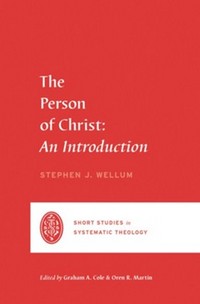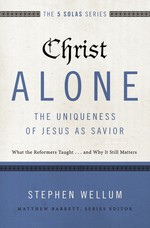 |
The Person of Christ: An Introductionby Stephen Wellum Paperwork, 180 pg. Read: August 29, 2021 |

Thinking through all chat Scripture says about Jesus and wrestling with the church as she has sought to faithfully confess Christ is not an easy task, but it’s absolutely necessary, especially if we are going to think rightly about God, the gospel, and the entire Christian faith, The study of Christology is not reserved for academic theologians; it’s the privilege, responsibility, and the glory of every Christian.
What’s The Person of Christ: An Introduction About?
In this installment of Short Studies in Systematic Theology, Wellum examines the doctrine of the Incarnation, the Second Person of the Trinity, and the Divinity of Jesus.
He spends four chapters opening the Scriptural testimony concerning Christ and the Incarnation. Then he looks at the development of the Church’s teaching and doctrinal formulation from an historical perspective—pre-Chalcedon, post-Chalcedon, and then contemporary issues. Finally, he gives a couple of chapters of theological reflection and summary.
The Strengths of the Book
I really appreciated most of the book, but two chapters, in particular, stood out to me—Chapter 2, “The Identity of Christ from the Bible’s Storyline” and Chapter 8, “Jesus as God the Son Incarnate.”
Chapter 2 lies the foundation for the next two chapters of the consideration of Christ as presented in the New Testament by examining the storyline of the Old Testament starting with Creation, the Fall, and then seeing how the Law and Prophets point to the coming Messiah.
Chapter 8 draws the testimony of Scripture and the formulations of the creeds, confessions, and theology of The Church throughout history into ten doctrinal statements explaining the essential elements of Jesus’ identity and the doctrine of the Incarnation.
The call to action in the last chapter, “Recovering the Centrality of Christ.” is a great conclusion—something that not every entry in the series has had, but is a welcome presence, and does a good job of wrapping up the book, summing up the high points and pointing the reader to application.
As One of the Short Studies in Systematic Theology
Of the four entries in this series that I’ve read this is the least accessible overall—most of the book is just fine on that front. A large part of that less-than-accessibleness comes from the fact that this appears to be a shorter version of Wellum’s 2016 book, God the Son Incarnate: The Doctrine of Christ. Assuming I’m right about that, he should’ve edited a bit more for this. Part of the first chapter (“Approaching Scripture on Its Own Terms to Identify Christ”) and most, if not all, of the seventh (” Current Challenges to Christological Orthodoxy”) seem unnecessarily technical, and possibly beyond the Introductory nature of this series.
I’m not saying they’re completely inaccessible to laity, but they felt out of place for both the series and the rest of the book. Maybe it was just my mood or attention span as I read it, but those parts of the book in particular, bugged me.
So, what did I think about The Person of Christ: An Introduction?
Overall, I liked it—I do think it would’ve been stronger without the chapters I mentioned in the previous section (or just with them reworked). But pushing that aside—this is an important entry in the series and focuses on things that too often get ignored.
I appreciated this entry in the series, but do hope the next entry I read is a little more in line with the others. Still, get your hands on this—what it does right is very good, and the rest isn’t bad, either.

This post contains an affiliate link. If you purchase from it, I will get a small commission at no additional cost to you. As always, opinions are my own.
![]()




